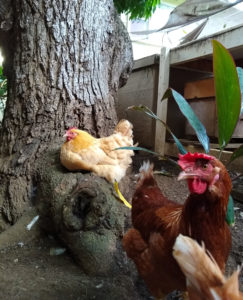Backyard Chickens
If you have the space and am willing to make a few minor accommodations, starting a small flock of laying hens is, in my opinion, one of the best things you can do to become more self-sufficient.
Laying hens, for the most part, require very little daily attention.


They need:
- Clean space. Chickens are not fussy about stepping in their own mess. So it’s your responsability to keep their environment clean.
- Fresh water. Chickens will drink from a muddy puddle, a flower pot… pretty much any thing that holds a liquid. So it’s important to make sure that they have easy access to clean water, or they might go looking for other less desirable things to drink.
- Sun light. Laying hens need to produce a lot of vitamin D. So they spend a large percentage of their time sunning themselves to absorb ultraviolet light. A hen’s rate of egg production is directly related to the number hours she spends sunning herself. Sun light also regulates hormone production and can be used to keep hens from going “broody”.
- Dust or fine sand. Chickens use dust baths to smother parasites like fleas and mites. They also use the dry dust to absorb moisture which keeps their feathers and skin healthy.
- A quiet nest. Hens are vulnerable while they are laying, so they are very particular about where they choose to nest. Giving them space to be alone and a wide variety of options is the best way to keep a hen laying consistantly. A laying hen that is frequently interrupted may stop laying untill she has found a locations that makes her feel more secure.
A grassy yard or small field is ideal. But chickens will also do just fine in a coop or a fenced run.
Yards and Fields
Pros
- free feed: hens will eagerly forage for weeds, grass seeds, insects, lizards, slugs and snails.
- direct sun light: hens need access to ultraviolet light to synthesize vitamin D.
- dust baths: hens use fine particles in sand and soil to smother mites and parasites.
- low maintenance: droppings breakdown on their own in the sun and rain.
- companionship: hens are curious and social creatures that injoy human company. They will greet and follow you whenever you are in the yard.
- home security: hens sound a distinctive alert whenever anyone/anything unusual enters their territory .
Cons
- vandalism: chickens love fresh greens, and will devour an unprotected garden.
- poisoning: chickens will sample everything. So care has to be taken to secure chemicals and toxic materials in their environment.
- predation: a larger perimeter means more potential for harassment from unfamiliar dogs and cats. This is not often fatal but it can cause unhealthy stress to the hens.
- injury: hens are very curious explorers. Care has to be takesn to keep them away from traffic or environmental hazzards.
Coops and Runs
Pros
- safety: confinement allows you to controll environmental risks from predators, hazards or poisoning.
- convenience: feed and water are easily managed.
- organic fertilizer: chicken manure is easy to collect for use in the garden.
Cons
- high maintenance: coops and runs should be cleaned daily to avoid flies and oder.
- disease: hens kept in confinement are less able to regulate their own self-care. Foraging enables hens to suppliment their diet with calcium, vitamins, and protein as needed. They are also unable to regualte their UV absorbtion and seekout dust baths or fresh water as needed on their own.
- aggression: hens are constantly establishing their hierarchy in their groupd. Constant pecking without the ability to seek relief can cause stress and increase susceptibility to illness.
Feeding
When it comes to feeding chickens are not fussy.
A 50 pound bag of commercial feed is affordable, will last a very long time, and is very convenient to store and distribute. But the cost of the feed means that grocery store eggs are less expensive.
A Free Renewable Resource
It’s a chicken’s ability to thrive on kitchen scraps and forage that really makes it stand out as an urban farming resource. In the world of professional foragers, our hens eat like royalty.

We feed them:
- vegetable cuttings
- stale bread
- table scraps
- old rice
- leftovers
In many households these “waste products” would end up in a landfill, sometimes in a compost pile. But in our home, scraps are just an intermediary stage on their way to becoming fresh eggs.